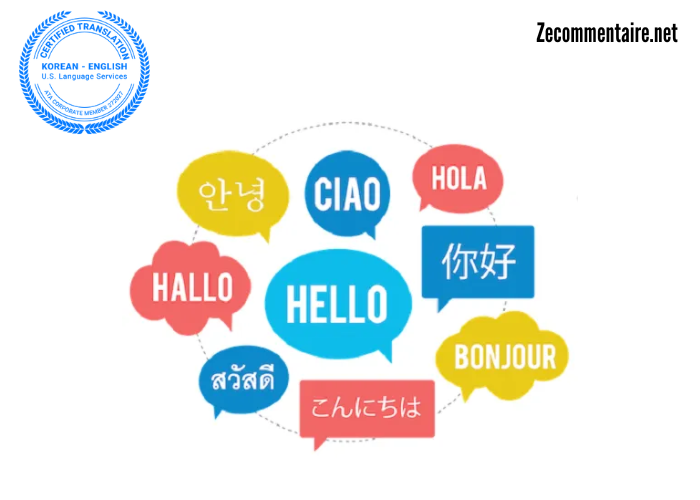Translation services play a vital role in our increasingly connected global society. As barriers between cultures and languages continue to break down, the need for accurate and efficient translations becomes more evident. One particular language combination that requires specialized attention is translate Korean to Indonesian. With Korea’s growing influence in various industries and the increasing demand for communication in the Indonesian market, the need for professional translation services in this language pair is on the rise.
The significance of translation services cannot be understated. Effective communication is crucial for businesses, individuals, and even governments. In the context of Korean to Indonesian translation, accurate and culturally appropriate translations are essential for bridging the gap between two distinct cultures and enabling effective communication. Whether it’s for business purposes, legal documents, or personal communication, a reliable translation service provider can ensure that your message is accurately conveyed from Korean to Indonesian and vice versa.
The challenges of translating Korean to Indonesian
Translating Korean to Indonesian presents unique challenges due to the linguistic and cultural differences between the two languages. Korean is a complex language with its own unique grammar, script, and honorifics system, while Indonesian is a rich and diverse language with its own set of grammar rules and cultural nuances. The differences in sentence structure, verb conjugation, and vocabulary make it challenging to produce accurate and natural translations.
Cultural differences also pose challenges when translating Korean to Indonesian. Each language is deeply rooted in its respective culture, and a successful translation requires not only linguistic proficiency but also cultural understanding. Translators must be aware of cultural nuances, idioms, and references to ensure that the translated text is culturally appropriate and resonates with the target audience.
Furthermore, the rapid evolution of language and the continuous emergence of new words and phrases present ongoing challenges for translators. Staying up-to-date with the latest trends and vocabulary in both Korean and Indonesian is essential to ensure accurate and relevant translations.
The benefits of using professional translation services
When it comes to translating Korean to Indonesian, relying on professional translation services offers numerous benefits. Here are some key advantages of working with a reputable translation service provider:
Accuracy and quality
Professional translators have the expertise and linguistic skills to produce accurate and high-quality translations. They are well-versed in the nuances and intricacies of both Korean and Indonesian languages, ensuring that the translated text is faithful to the original meaning while being culturally relevant.
Cultural understanding
A professional translation service provider will have translators who are not only proficient in the languages but also have a deep understanding of the respective cultures. This ensures that the translated text is culturally appropriate, taking into account the target audience’s preferences, beliefs, and customs.
Time and cost efficiency
Hiring a professional translation service provider can save you valuable time and resources. Translating Korean to Indonesian is a complex task that requires specialized knowledge and experience. By outsourcing this task to professionals, you can focus on your core business activities, while the translators work efficiently to deliver accurate and timely translations.
Confidentiality and security
Professional translation service providers prioritize confidentiality and data security. They have robust systems in place to protect sensitive information and ensure that your documents are handled with utmost care and professionalism.
How to choose the right translation service provider
Selecting the right translation service provider is crucial to ensure accurate and reliable translations. Here are some factors to consider when choosing a translation service provider for your Korean to Indonesian translation needs:
Expertise and specialization
Look for a translation service provider that specializes in Korean to Indonesian translations. Language expertise and subject matter knowledge are essential to produce accurate translations in specific domains such as legal, medical, technical, or marketing.
Quality assurance processes
Inquire about the quality assurance processes implemented by the translation service provider. Do they have a team of experienced editors and proofreaders who review the translated text for accuracy, grammar, and style? A robust quality assurance process ensures that the final translation meets the highest standards.
Industry experience and client testimonials
Consider the translation service provider’s industry experience and reputation. Look for client testimonials and reviews to gauge their track record and customer satisfaction. An experienced translation service provider with positive feedback from clients is more likely to deliver reliable and high-quality translations.
Technology and tools
Inquire about the translation service provider’s use of technology and translation tools. While human translators are crucial for accurate and culturally appropriate translations, technology-assisted translation tools can enhance efficiency and consistency. Ask about the translation service provider’s use of translation memory, glossaries, and machine translation to ensure a streamlined translation process.
Pricing and turnaround time
Finally, consider the pricing and turnaround time offered by the translation service provider. While cost is an important factor, it should not be the sole determinant. Balance affordability with quality and ensure that the turnaround time aligns with your project requirements.
Tips for translating Korean to Indonesian effectively
Translating Korean to Indonesian effectively requires careful attention to linguistic and cultural details. Here are some tips to help you achieve accurate and natural translations:
Understand the cultural context
Familiarize yourself with the cultural context of both Korean and Indonesian to ensure accurate and culturally appropriate translations. Be aware of cultural nuances, idioms, and references that may require adaptation or explanation in the target language.
Choose the right tone and style
Consider the intended audience and purpose of the translation when choosing the tone and style. Korean and Indonesian have different levels of formality and politeness, so adapt the language accordingly to convey the appropriate tone.
Use professional translation tools
Leverage professional translation tools such as translation memory and glossaries to ensure consistency and efficiency in your translations. These tools can help maintain consistency in terminology and save time by reusing previously translated segments.
Proofread and edit
Always proofread and edit your translations to ensure accuracy, grammar, and style. Consider seeking feedback from native speakers or professional proofreaders to further enhance the quality of your translations.
Continuously update your language skills
Stay updated with the latest trends, vocabulary, and idiomatic expressions in both Korean and Indonesian. Language is constantly evolving, and keeping abreast of these changes will help you produce relevant and up-to-date translations.
Common mistakes to avoid when translating Korean to Indonesian
Translating between Korean and Indonesian can be challenging, and certain mistakes are commonly made. Here are some pitfalls to avoid when translating Korean to Indonesian:
Literal translations
Avoid translating word-for-word, as this can lead to awkward and inaccurate translations. Focus on conveying the intended meaning rather than adhering strictly to the source text.
Ignoring cultural nuances
Cultural nuances play a crucial role in translations. Be mindful of the cultural context and adapt the translation accordingly to ensure that it resonates with the target audience.
Neglecting proofreading and editing
Proofreading and editing are essential to ensure the accuracy and quality of translations. Neglecting these steps can result in errors and inconsistencies in the final translation.
Overlooking localization
Localization involves adapting the translation to the target culture, taking into account linguistic, cultural, and regional preferences. Ignoring localization can lead to misunderstandings and ineffective communication.
Not seeking professional help
Translating Korean to Indonesian requires expertise and linguistic skills. Relying solely on automated translation tools or inexperienced translators can result in inaccurate and unprofessional translations. Seek professional help to ensure accurate and reliable translations.
Tools and resources for translating Korean to Indonesian
Several tools and resources can assist in translating Korean to Indonesian effectively:
Translation memory software
Translation memory software, such as SDL Trados or MemoQ, can help translators maintain consistency and increase efficiency by storing previously translated segments for reuse.
Online dictionaries and glossaries
Online dictionaries and glossaries, such as Naver Dictionary or Kamus.net, provide quick access to translations, definitions, and terminology in both Korean and Indonesian.
Language learning platforms
Language learning platforms like Duolingo or Memrise can help translators improve their language skills and stay updated with the latest vocabulary and idiomatic expressions.
Collaboration and project management tools
Collaboration and project management tools, such as Slack or Trello, can streamline communication and workflow between translators, editors, and clients, ensuring a smooth translation process.
The impact of accurate translation on businesses and individuals
Accurate translation from Korean to Indonesian has a significant impact on both businesses and individuals. For businesses, effective communication is crucial for expanding into new markets, establishing partnerships, and reaching a wider audience. Accurate translations enable businesses to convey their message clearly and professionally, building trust and credibility with their target market.
For individuals, accurate translations facilitate personal and professional relationships. Whether it’s for immigration purposes, education, or personal communication, accurate translations ensure that individuals can navigate language barriers and effectively communicate their thoughts, ideas, and needs.
Case studies: Successful Korean to Indonesian translations
Many businesses and individuals have benefited from accurate and reliable Korean to Indonesian translations. Here are two case studies highlighting successful translations:
Company A: Expanding into the Indonesian market
Company A, a Korean technology company, aimed to expand its operations into the Indonesian market. They relied on a professional translation service provider to translate their marketing materials, user manuals, and website content from Korean to Indonesian.
The accurate and culturally appropriate translations helped Company A effectively communicate their products’ features and benefits, resulting in increased brand awareness and customer engagement in the Indonesian market.
Individual B: Immigration documentation
Individual B, a Korean citizen, needed assistance with translating their immigration documentation for their relocation to Indonesia. They sought the expertise of a professional translation service provider to translate their personal documents accurately and efficiently.
The reliable translations enabled Individual B to navigate the immigration process seamlessly, ensuring that their documents met the requirements and regulations of the Indonesian authorities.
Conclusion
In our interconnected world, language translation plays a vital role in breaking down barriers and fostering effective communication. Translating Korean to Indonesian is a task that requires expertise, cultural understanding, and attention to detail.
By utilizing professional translation services and following best practices, businesses and individuals can unlock the power of language and effectively engage with the Korean and Indonesian markets. Embrace the importance of accurate translation, and reap the benefits of seamless communication in this dynamic language pair.




